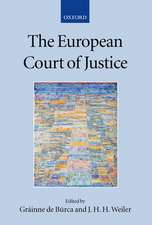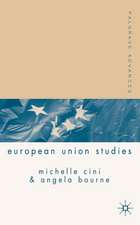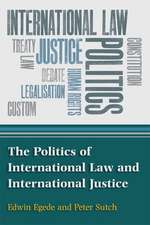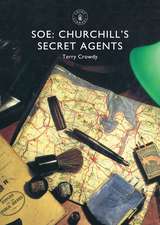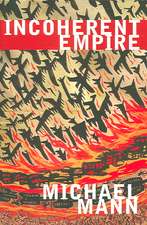Enemies of the American Way: Identity and Presidential Foreign Policymaking
Autor Dr. David Bell Mislanen Limba Engleză Paperback – 12 mar 2014
Preț: 256.67 lei
Preț vechi: 294.96 lei
-13% Nou
Puncte Express: 385
Preț estimativ în valută:
49.11€ • 51.42$ • 40.64£
49.11€ • 51.42$ • 40.64£
Carte tipărită la comandă
Livrare economică 07-21 aprilie
Preluare comenzi: 021 569.72.76
Specificații
ISBN-13: 9781628924053
ISBN-10: 1628924055
Pagini: 240
Dimensiuni: 152 x 229 x 13 mm
Greutate: 0.32 kg
Editura: Bloomsbury Publishing
Colecția Bloomsbury Academic
Locul publicării:New York, United States
ISBN-10: 1628924055
Pagini: 240
Dimensiuni: 152 x 229 x 13 mm
Greutate: 0.32 kg
Editura: Bloomsbury Publishing
Colecția Bloomsbury Academic
Locul publicării:New York, United States
Caracteristici
Draws a theory of threat identification based on cases studies drawn from 19th century presidencies
Notă biografică
David Bell Mislan is Assistant Professor in the U.S. Foreign Policy Program at American University's School of International Service. His teaching and research interests are foreign policy analysis, international security, and qualitative methods. In addition to his teaching and research, Dr. Mislan is active with civic engagement initiatives in Eastern Europe and the United States.
Cuprins
Introduction1. Rule-Based Identity and Threat Identification2. Alternate Approaches to Explaining Threat Identification3. Grover Cleveland and Enemies of the American Way4. The Person and Presidency of Benjamin Harrison5. William Mckinley and Enemies of the American Way6. Identity and Threat in the Post-Cold War EraBibliographyIndex
Recenzii
"Friend or enemy? Benign or dangerous? A toothy grin or bared fangs? How we see the world around us determines how we respond to it. But the process of interpreting our environment is a complex one, as David Mislan demonstrates. In the late nineteenth century, America reversed its historic course and moved aggressively onto the world stage. Why? Mislan's careful examination of three presidents - Cleveland, Harrison, and McKinley - offers important insight into the factors that shape how leaders come to distinguish "threats" from the universe of other realities they face. Today, how will America interpret the rapidly changing world it faces, separate "threats" from the chaff of daily events, and chart a forward course? Mislan's insights help us understand where we may be heading, and why." - Edward Rhodes, Dean, School of Public Policy, George Mason University
"David Bell Mislan's nuanced account of how U.S. presidents constructed foreign threats during the pivotal moment in which America emerged as a fledgling global power compels us to reconsider conventional explanations of threat identification. Through well-planned comparative case studies Grover Cleveland, Benjamin Harrison, and William McKinley come alive as vibrant individuals whose own beliefs about what it meant to be 'American' shaped threat identification in fundamental ways. Insightful and highly readable, Enemies of the American Way does more than document and explain foundations of American foreign policy on the eve of the 20th century-its framework provides tools for understanding changing threat assessments during our own crucial, potentially transformative moment in America's trajectory as a leading global power." -Jonathan M. DiCicco, Ph.D. Director, International Relations Program and Assistant Professor of Political Science, Canisius College
[David Bell Mislan] has done a service in reminding us how important individual presidents' own preconceptions and mindsets were then and still are now in shaping global foreign policy.
"David Bell Mislan's nuanced account of how U.S. presidents constructed foreign threats during the pivotal moment in which America emerged as a fledgling global power compels us to reconsider conventional explanations of threat identification. Through well-planned comparative case studies Grover Cleveland, Benjamin Harrison, and William McKinley come alive as vibrant individuals whose own beliefs about what it meant to be 'American' shaped threat identification in fundamental ways. Insightful and highly readable, Enemies of the American Way does more than document and explain foundations of American foreign policy on the eve of the 20th century-its framework provides tools for understanding changing threat assessments during our own crucial, potentially transformative moment in America's trajectory as a leading global power." -Jonathan M. DiCicco, Ph.D. Director, International Relations Program and Assistant Professor of Political Science, Canisius College
[David Bell Mislan] has done a service in reminding us how important individual presidents' own preconceptions and mindsets were then and still are now in shaping global foreign policy.
Descriere
The book examines the role of identity in the decision-making of presidents Cleveland, Harrison, and McKinley to develop a theory applicable to today's presidential policymaking.





